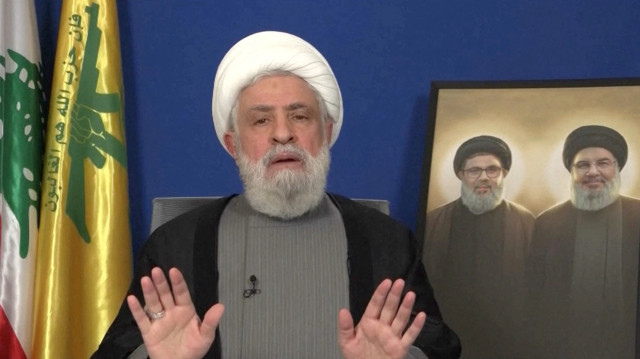

File photo
Naim Qassem outlines group's 2 main demands -- an end to Israeli aggression and the preservation of Lebanon's sovereignty
Hezbollah Secretary-General Naim Qassem said Wednesday that his group submitted feedback on a US proposal to halt Israel's aggression against Lebanon, noting that a deal now depends on the Israeli response and the “seriousness” of Prime Minister Benjamin Netanyahu.
In a televised address, Qassem pointed to Hezbollah's resilience on the battlefield, saying the group is prepared to inflict heavy losses on the Israeli military. He also made it clear that Hezbollah is not suspending its operations while awaiting the outcome of negotiations.
“We received the negotiation paper, reviewed it thoroughly and offered our feedback,” Qassem said, adding that Lebanese Speaker of Parliament Nabih Berri also had comments, which were aligned with Hezbollah's position.
“These comments were presented to US envoy Amos Hochstein and were discussed in detail.”
Qassem emphasized that Hezbollah would refrain from discussing the specifics of the proposed agreement until the negotiations proceed calmly.
He underscored that the success of the talks now depends on Israel's response to their feedback.
Qassem said Hezbollah's negotiation principles are based on two main demands: a complete and comprehensive cessation of hostilities and the preservation of Lebanon's sovereignty.
He rejected Netanyahu's claim that Hezbollah is negotiating “under fire,” stressing that Israel is also under fire.
“We are operating on two fronts -- military operations and negotiations -- and we will not suspend military activity while awaiting the results of the talks,” he said.
He added that Hezbollah remains firm in rejecting the notion that Israel could secure through negotiations what it failed to achieve on the battlefield.
As the US continues to support Israel's ongoing genocide in Lebanon and Gaza, Washington is mediating a cease-fire agreement between Tel Aviv and Hezbollah.
However, concerns have emerged in Lebanon about potential Israeli demands, particularly concerning Israel's request for freedom of movement for the Israeli army in Lebanon to respond to any violations of the cease-fire agreement.
Earlier Wednesday, after meeting with Speaker Berri for the second time in 24 hours, Hochstein spoke of “additional progress” in the cease-fire negotiations between Israel and Hezbollah.
He declined to go into details, saying only that “as planned, if we made progress, I would go to Israel to conduct further discussions there based on the talks here, and we'll see what we can achieve.”
-Ready for long battle
Qassem also affirmed Hezbollah's readiness for a prolonged conflict, warning that the Israeli military would face significant losses as it advances into southern Lebanon.
“It's not important that the enemy enters one village or another; what matters is how many of them are killed and where our fighters confront them,” he said.
He said Hezbollah's role is not to prevent the enemy's advance but to resist them wherever they move forward.
“The field will determine the outcome, and the results depend on what happens on the battlefield. The resistance is capable of fighting a long war,” Qassem said.
“We will stay on the battlefield and fight no matter the cost, which will also be costly for the enemy,” he added.
Qassem reaffirmed Hezbollah's “deterrence equation” with Israel, saying that Israel should have expected a Hezbollah strike on central Tel Aviv following its attack on central Beirut that led to the assassination of the group's media relations chief, Mohammad Afif.
He was referring to Monday's events, when Israeli media reported that five Israelis were injured and Ben Gurion Airport shut down due to explosions and fires in the greater Tel Aviv area.
The Israeli military acknowledged that a heavy missile launched from Lebanon hit the region, admitting failure in intercepting it.
This came one day after Hezbollah officially announced the death of Afif in an Israeli airstrike on the Ras al-Nabeh area in Beirut.
Israel has been engaged in cross-border warfare with Lebanon, launching an air campaign against what it claims are targets of the Hezbollah group in late September.
More than 3,550 people have been killed in the Israeli attacks, with over 15,100 injured and more than a million displaced since last October, according to Lebanese health authorities.
Israel expanded the conflict by launching a ground assault into southern Lebanon on Oct. 1 this year.
#Benjamín Netanyahu
#cease-fire
#Hezbollah
#Israel
#Lebanon
#Naim Qassem
#Truce
#US
